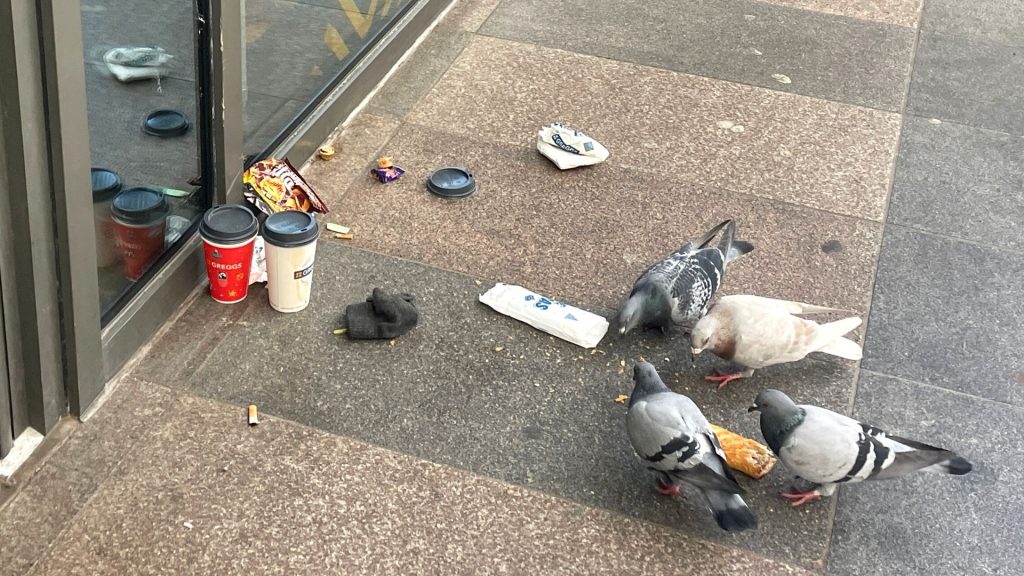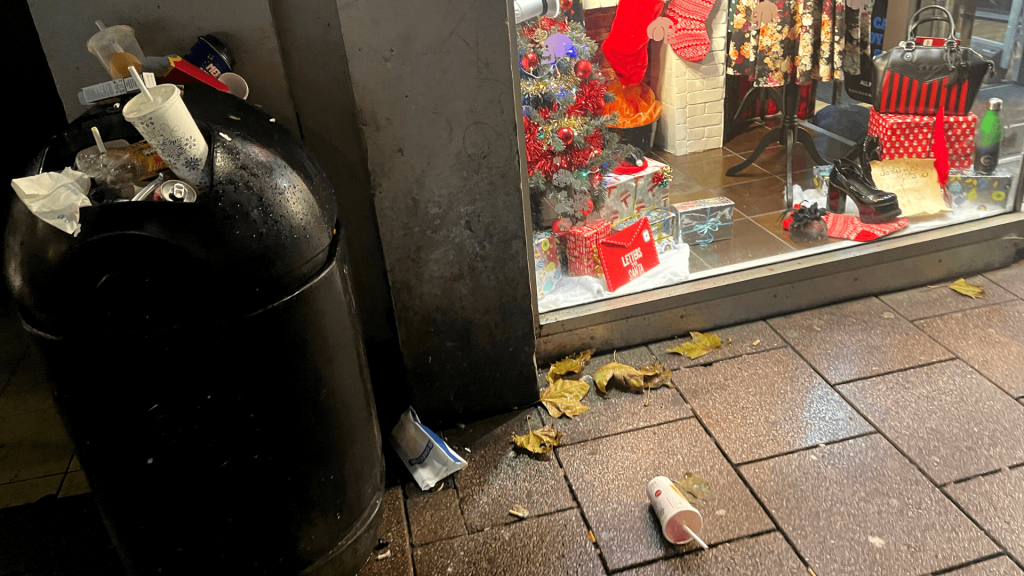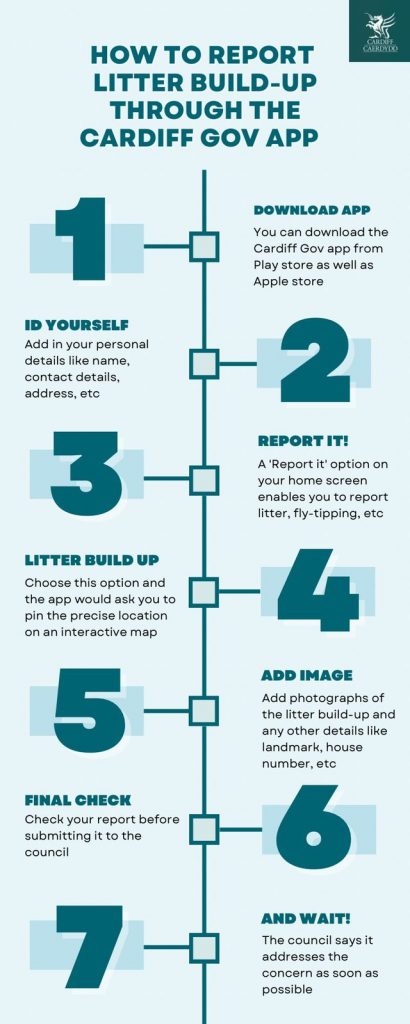While a part of Butetown thinks it is the need of the hour, Cardiff council and environment organisations have a different view

Credits: Poorvi Singhal
A mum shrills, “David, come on, hurry up!” as he kicks a half-empty bottle of Coke onto a dustbin in St Mary’s street after Iran defeats Wales. It was just another addition to the bag of chips, mayo-smeared burger box and squished bottles of iced tea that make for 20.7% of all litter in Wales, as per a recent survey.
Of late, many people have been complaining about litter. Tali Morrish, manager at Mrs Potts Chocolate House in Morgan Arcade believes litter sometimes impacts her business as she has seen bins being ripped onto the street outside her cafe which only got cleared the next morning.
But, who is accountable for this overflowing rubbish – grumpy David, his mum, or the litter enforcement officers responsible for managing them?

Credits: Poorvi Singhal
Cardiff Council has appointed waste enforcement officers throughout the city who can issue Fixed Penalty Notices (FPNs) worth £100 if they see anyone littering.
Litter includes items like sweet wrappers, fast food packaging, cigarette butts and chewing gums thrown onto the streets. One can also be penalised for littering from a vehicle.
The council also has street cleansing teams that collect litter on their regular cleansing rounds however, they are not authorised to penalise litterers.
Thomas, a member of the cleansing team in Butetown says we need more bins to control litter, especially outside bars that get crowded on weekends.
He adds, “we definitely need someone out there fining people. People feel it’s okay to throw away their cigarette butts on roads, it’s not cool.
“I was here at 5am to clean the street and all the rubbish outside these food joints is disgusting and takes a lot of effort to clean.”

Credits: Poorvi Singhal
A street cleanliness survey conducted by Keep Wales Tidy in 2021-22 shows that litter dropped by pedestrians accounts for 84.2% of all litter on streets in Wales. Smoke litter (cigarette butts, filter tips, lighters) and confectionary waste like lolly sticks, crisp packets, etc also significantly contribute to the overall litter.
“It is disgusting out there, absolute carnage,” says Morish. “I think more people need to be fined. I don’t think people are actually getting caught littering. Who is going about and giving these fines? Like, I’ve never seen anyone.” she adds.
A Freedom of Information (FOI) report says, Cardiff had only 25 litter enforcement officers overseeing the entire city between 2017 and 2018 and 18 between 2016 and 2017, five less than in 2015-16. Considering Cardiff is the largest city in Wales by area (140.3 square km), the number of officers may not be sufficient to guard the entire city.
If you want the donkey to move, use a carrot, not a whip. But sometimes you need to use a whip
Swansea council authorised more officers to issue FPNs in 2021 to manage litter whereas Cardiff Council believes in education over enforcement.
Number of fines issued
Cardiff council issued mere 61 fines for littering in 2020-21 out of which only 42 were paid. The remainder were not tried in the Magistrate’s Court, according to an official government website.
However, in a recent FOI report, the council said it issued 168 fines in 2021, which is roughly 3 fines per week. It issued 137 fines in 2020 whereas Rhondda Cynon Taff county borough council penalised 224 litterers between April 2020 and March 2021.
Although Cardiff council doesn’t hold the data for years before 2018, it can be deduced it wouldn’t have penalised many litterers. On the contrary, Newport council’s enforcement team issued 940 penalty notices between March and December of 2016. Those who refused to pay the penalty ended up in court.
Anyone penalised in Cardiff who fails to pay their FPN within a month can be legally tried in the Magistrate’s Court. The fine is reduced by 50% if the amount is paid within 14 days of the charge.
Education over enforcement
Keep Wales Tidy, a charity working with local communities in Wales to protect the environment believes enforcement alone is insufficient and only works when combined with wider engagement and a prevention strategy.
Its policy and research manager, Jemma Bere explains, “The main issue with enforcement is that the crime has to be witnessed, this is resource intensive in terms of staff time on the ground but also on the administrative staff and the courts.

“We have researched places like Singapore where littering fines are particularly high and have found that they do not have as much of an impact as general perception might suggest.”
Bere also says education and engagement should always be the first port of call. She says people should have bins in their cars and authorities must put informative messages on roads to stop people from littering.
However, business manager Morrish says we need more people on-ground to collect litter, fine more people if necessary and increase the value of fines to at least £150 like in Bath.
Morrish says, “If you want the donkey to move, use a carrot, not a whip. But sometimes you need to use a whip.”
Councillor Margaret Lewis of the Butetown area who is also an appointed member of the Environmental Scrutiny Committee says they have more cleaning staff employed for match days to tackle excessive litter. On the enforcement front, Lewis says fining isn’t a long-term solution. She believes, “Educating people about this problem is a more effective solution.”
She also mentions the Cardiff Gov mobile app developed by Cardiff council through which we can report litter (not the litterer), fly-tipping and dog fouling to the council.
So, what happens the next time you see rubbish build up? You can either report it via the app or appeal to your council for more litter enforcement officers and wait for David’s mum to be penalised. Is the rubbish picker right in saying we need more bins? Probably appeal for them too.
